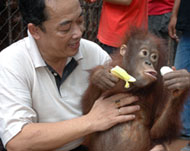Blow to Thailand monkey business
Orangutans forced to perform in a Thailand zoo may soon be returned to the jungles of Southeast Asia, in a small victory in the struggle against the illegal wildlife trade.

On Friday and Saturday, officials met in Bangkok for the first time to discuss the best way to handle the orangutans’ long-awaited homecoming and decided to send them to Indonesia while awaiting results of DNA tests.
The animals, smuggled into Thailand, were forced to perform boxing matches for visitors at a Bangkok zoo, as spectators snapped photos.
But now, more than 50 orangutans may finally go home.
Sean Whyte, chief executive of Nature Alert, a non-profit environmental group, said: “We’re sending a strong signal that the game is over now. Anyone who tries to make a living selling orangutans will find it very difficult.”
The simian saga started in 2003 when government officials raided Safari World, a zoo in the eastern suburbs of Bangkok, and recovered 114 orangutans.
Before their rescue, the apes were forced into donning silk shorts and boxing gloves, and performing mock kickboxing matches. The show was one of Safari World’s main attractions.
Zoo owners claimed the primates were bred in-house, but DNA tests proved that 57 were born outside Thailand, most likely in Malaysia or Indonesia.
Awaiting repatriation
Officials sent the wild orangutans to the Khao Pratap Chang wildlife preserve to await repatriation. Three have since died.
 |
|
The orangutans are being tested |
Since the case first came to light, the orangutans have been in a well-publicised tug of war between Thai officials and non-government organisations.
NGOs say the government has been unco-operative and slow in sending the animals back.
The government, however, says it is doing everything to ensure the apes’ survival in the wild, including further DNA testing to determine whether the apes came from Malaysia or Indonesia.
Tassannee Vejpongsa, a representative of the WildAid foundation, said if the tests show the orangutans are from Malaysia, they will be sent there from Indonesia.
Chawann Tuhikorn, Thai deputy chief of national parks, said: “The sooner we repatriate them, the better, because they will have a greater chance of survival in the wild.”
He added that the government had planned from the beginning to send the apes back.
“We said we would do anything in our power to do it right. We want to do things properly and through the right channels.”
Right direction
The Borneo Orangutan Survival Foundation (BOS) says at least 700 orangutans are smuggled annually in Southeast Asia, with an estimated 100-300 trafficked through Thailand alone.
 |
|
Orangutans are native to |
The primates are native to the Indonesian island of Sumatra, and to Borneo, an island shared by Brunei, Indonesia and Malaysia.
Experts say only about 27,000 remain in the wild and that their numbers are fast declining because of deforestation and trafficking.
Although the Safari World case may set a precedent in the fight against animal smuggling, the battle is far from over.
Willie Smits, BOS chairman in Indonesia, said: “Orangutans are at the tip of the iceberg. The problem of animal trafficking is much bigger. Governments need to do more.”